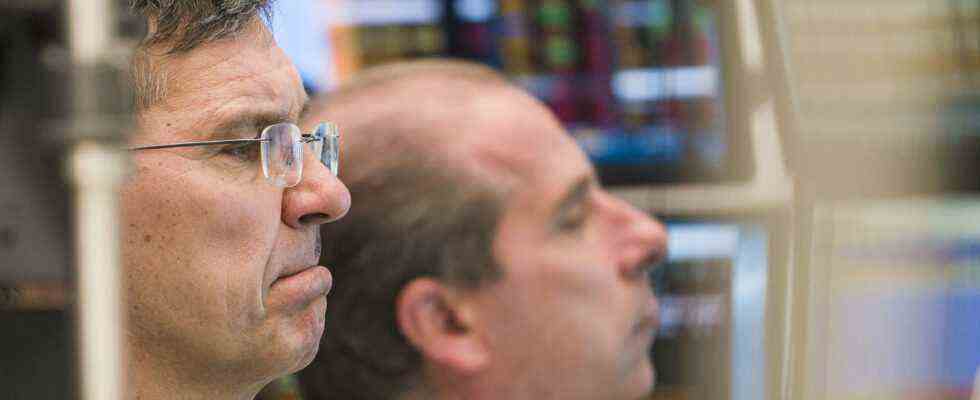market report
Status: 01/20/2022 07:52 a.m
Experts are forecasting a quiet start to trading for the DAX. The hoped-for positive impulses from the US accounting season have not materialized so far, and interest rate worries just won’t go away.
Banks and brokers expect that the DAX will start the trading day with little change. Yesterday, the leading German index rose 0.2 percent to 15,809.72 points.
In addition to geopolitical concerns about the Ukraine conflict, the prospect of interest rate hikes by the US Federal Reserve (Fed) continues to dampen investor sentiment. The current developments in the corona pandemic, on the other hand, do not represent a major stress factor: US Treasury Secretary Janet Yellen had announced that she did not expect Omicron to endanger the recovery of the US economy in the long term and in the long term.
China’s central bank is loosening
Meanwhile, the yield on 10-year Bunds has slipped back into negative territory. On Wednesday it had climbed above the zero percent mark for the first time in almost three years. The interest rate is currently minus 0.007 percent. The high on Wednesday was plus 0.025 percent. The development of bond yields is of great importance for the stock market, because rising yields provide an alternative to buying stocks there – they make interest-bearing securities more attractive.
In contrast to the Fed and the Bank of England (BoE), which are likely to raise interest rates in the coming weeks, the People’s Bank of China (PBoC) eased monetary policy. Because of an impending economic slowdown in the world’s second largest economy, the central bank lowered an important key rate.
Dow Jones loses
The US stock exchanges closed yesterday after a roller coaster ride in the red. The Dow Jones closed one percent lower at 35,028 points. The tech-heavy Nasdaq fell 1.2 percent to 14,340 points. The S&P 500 lost one percent to 4532 points.
Nikkei closes in positive territory
The stock markets in Asia were able to detach themselves from the bad mood. Experts spoke of bargain hunters who wanted to take advantage of the recent fall in prices. At the close in Tokyo, the Japanese Nikkei index was 1.1 percent higher at 27,773 points. Japan’s exports rose to a record high in December thanks to strong demand for cars. The exports of the third largest economy in the world increased for the tenth month in a row, by 17.5 percent compared to the previous year to around 61 billion euros. Imports also rose sharply by 41.1 percent due to high energy prices.
The Shanghai stock exchange was up 0.3 percent. The index of major companies in Shanghai and Shenzhen gained 1.1 percent.
What is the Turkish central bank doing?
It is eagerly awaited whether the Turkish central bank will stick to its loose monetary policy at today’s meeting despite massive inflation. The monetary authorities have already lowered the key interest rate several times, most recently to 14 percent. So far they have followed the line of President Recep Tayyip Erdogan, who is opposed to high interest rates. The interest rate decision will be announced at 12 noon.
Inflation had reached a value of around 36 percent in December and is thus at the highest level for around 20 years. Producer prices even increased by around 80 percent. The rapid fall in the exchange rate of the Turkish lira, which accompanies inflation, makes it more expensive to import goods into the country. The population suffers above all from high energy and food prices.
United Airlines reduces loss
The US airline United Airlines has significantly reduced its loss in the fourth quarter. The bottom line was a minus of 646 million dollars. In the same period of the previous year, the company was in the red at $ 1.9 billion due to the large burdens caused by the corona pandemic.
In the meantime, travel has picked up again and business has recovered somewhat. Revenue rose about 140 percent year-on-year in the final quarter to $8.2 billion.
Unilever will not increase bid for GSK consumer goods division
The British consumer goods group Unilever does not want to pay more for a possible purchase of the consumer goods division of GlaxoSmithKline (GSK). “We will not increase our bid above £50 billion,” Unilever said in London on Wednesday evening. GSK had rejected Unilever’s offer of around 60 billion euros as too low.
GSK’s consumer goods division includes health products such as Sensodyne toothpaste, Dr. Best toothbrushes, Voltaren pain ointment and Centrum-branded dietary supplements. Unilever is known for brands such as Langnese, Knorr and Pfanni, among others, and wants to expand its healthcare products business.

